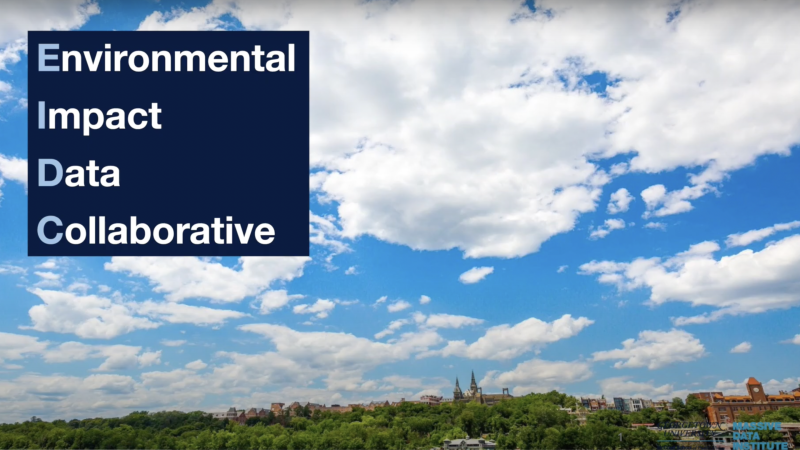Massive Data Institute partners with leading data scientists at Howard and Morgan State Universities

The cross-institutional team is developing an Environmental Impact Data Collaborative to support the use of data to make environmental policy more effective and just.
The Massive Data Institute (MDI) at Georgetown University’s McCourt School of Public Policy is partnering with researchers at Howard University and Morgan State University to develop the Environmental Impact Data Collaborative (EIDC), a data and computing infrastructure that will support community groups, policymakers and scholars in their efforts to make environmental policy more effective and just.
The cross-institutional partnership will allow the EIDC to engage with communities most affected by environmental injustice more directly and to develop a diverse network of researchers and activists who can transform data into solutions that promote equity and fight climate change.
Play Youtube Video
“We want to build a long-term, sustainable and inclusive infrastructure, and we could not do that without engaging data scientists at Historically Black Colleges and Universities,” said Michael Bailey, Colonel William J. Walsh Professor of American Government in Georgetown’s Department of Government and the McCourt School of Public Policy.
“We are proud of the work our faculty, researchers and students have done, and the relationships we have built with faculty and researchers at Howard University and Morgan State University, the federal government and public interest advocates,” he said.
MDI is working with 13 researchers at Howard University across five projects to analyze how environmental factors can have a disparate impact on disadvantaged communities, including projects focused on testing air quality in low-income households, connecting traffic pollution in marginalized populations and identifying environmental patterns in health outcomes in Washington, DC.
MDI’s research partners at Morgan State University are building on their research capacity in computer science to automate the ingestion and cleaning of data from new sources. Their work will also expand Morgan State students’ opportunities to do research and policy work at the intersection of computer science and environmental policy.
“Environmental justice needs collaboration from diverse groups,” said Dr. Paul Wang, professor and chair of computer science at Morgan State University. “The Georgetown, Howard and Morgan State partnership promotes the equity of all people and will make a huge impact toward a better environment.”
“Howard University is thrilled to be a partner with Georgetown University’s McCourt School of Public Policy, Morgan State University and Bezos Earth Fund on the very important issues of climate change,” said Barron Harvey, associate provost for academic innovation and strategic initiatives at Howard University. “Top Howard University faculty researchers are addressing the climate change areas of environmental justice, environmental quality health risks and pollution. This partnership and the support of Bezos Earth Fund will yield strategic recommendations and important policy recommendations that will benefit society now and into the future.”
In December of 2021, MDI received a $3.2M grant from the Bezos Earth Fund to further its research and impact in communities most at risk of environmental injustice. Launched in 2020, the Bezos Earth Fund is Jeff Bezos’s $10 billion commitment to fund scientists, activists, NGOs and private-sector entities that are taking critical action to combat the climate crisis, preserve and protect the natural world, and support climate justice.
Learn more about the Environmental Impact Data Collaborative here.
This article was originally published by the McCourt School of Public Policy. Please follow the link to read the full story.
